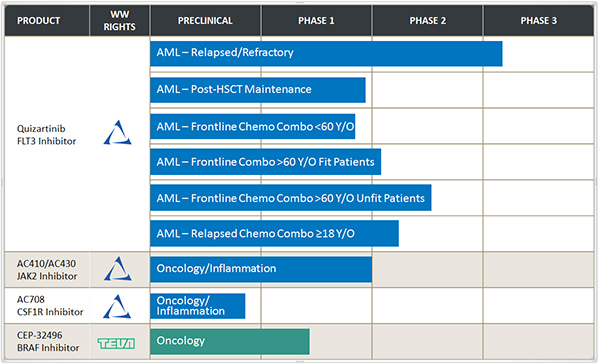Product Pipeline

Kinases: A Rich Source for Targeted Therapies
Kinases are a family of over 500 enzymes, collectively known as the kinome, that function as important mechanisms of signaling and regulation of important cellular processes such as activation, growth, proliferation, differentiation and survival. This key role in regulating the life cycle of cells also means that kinases can be involved in the underlying mechanisms for many human diseases, including cancer, autoimmune and inflammatory diseases. Therefore, kinases have proven to be a rich source of targets for drug development with 23 approved drugs since 2001 in oncology and inflammatory disease.
Our core competency is the discovery, optimization and development of highly selective and potent, orally-available small molecule drug candidates that inhibit validated kinase targets in diseases with significant unmet medical need. Ambit has developed a pipeline of small molecule targeted therapies using our expertise in kinase drug discovery and development. Our proprietary, kinase-focused chemical library has been developed internally over years of discovery efforts and currently contains approximately 8,000 compounds that are fully-annotated against a comprehensive kinase panel. This library represents a wealth of potential opportunities to rapidly initiate novel kinase inhibitor programs beyond our existing pipeline of drug candidates with highly potent and selective leads. Our collective experience in kinase discovery represents a core expertise that, together with our fully-annotated chemical library, provides the potential for sustainable pipeline expansion.
Oncology
Aberrant kinase function, caused by mutations or over-expression, underlies many cancer cell processes, making the kinome an important source for therapeutic targets in oncology. Discoveries of specific drivers of disease have led to the development of targeted therapies, or the tailoring of therapies to a particular tumor or disease profile. These targeted therapies, in some cases, have proven to be more efficacious while having fewer side effects than traditional non-targeted therapies, such as chemotherapy, with which kill healthy cells along with cancer cells. In recent years, specific inhibitors have gained significant attention as a mechanism of action in the treatment both of oncology and inflammatory diseases. We believe that therapies targeting specific genetic abnormalities in subsets of cancer patients identified through diagnostic tests will result in streamlined clinical trials, stratified patient populations and improved patient outcomes and will be increasingly important in the continued evolution of the treatment of cancer. We believe there is therapeutic potential for our kinase inhibitor program in oncology and/or autoimmune and inflammatory diseases due to their maximized selectivity and potency and their ability to minimize or eliminate off-target activity.
Autoimmune & Inflammatory Diseases
Opportunities for kinase drug development extend beyond oncology. The immune system and inflammatory processes are increasingly understood to play important roles in many disease states, and kinases are key mediators of cellular signaling, activation, proliferation, survival and differentiation of immune and inflammatory cells. Autoimmune and inflammatory diseases are often characterized by an overactive immune system response, which can be controlled through the inhibition of specific kinase signaling pathways. While there is a large opportunity for the development of kinase inhibitors in autoimmune and inflammatory diseases, the chronic nature of these diseases requires a safety profile to accommodate long term dosing. The safety profile of kinase inhibitors is often predicted by their selectivity profile, which represents their ability to target a single or small number of kinases.
Due to structural similarities among kinases, the key technical challenge in the development of targeted kinase inhibitors is the ability to design a drug that selectively and potently inhibits the specific kinase underlying disease while minimizing activity against other kinases, or off-target activity, which can lead to undesirable side effects and result in suboptimal efficacy. Our core competency is our ability to discover, optimize and develop drug candidates that are highly selective and potent against specific kinases.
